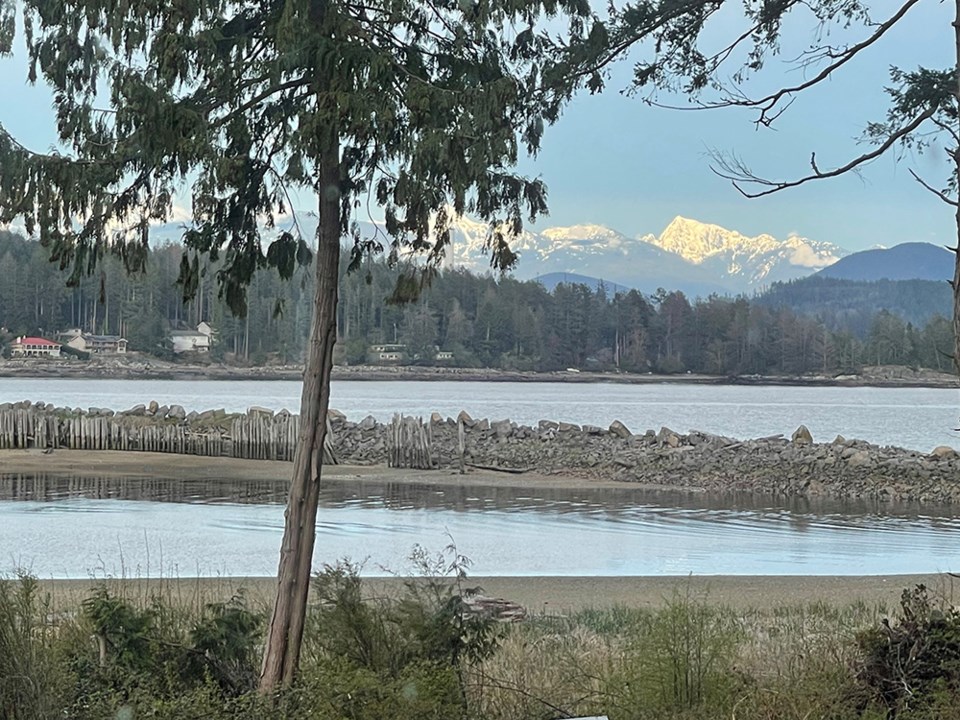A proposed rate hike for customers of Lang Bay Waterworks has caused concern for consumers of the water system.
Pat McCutcheon, a consumer, said he attended a meeting on November 15 at Kelly Creek Community School that was called to discuss the increase in water rates in the Lang Bay system, which is in Electoral C of qathet Regional District (qRD). McCutcheon said he spoke at the meeting, which attracted 70 to 80 people by his count.
“Potentially, if the rate increases are approved as of January 1, the rates for a single-family dwelling will go to approximately $3,000 a year, and for a lot of residents in the Lang Bay area, that is completely unaffordable,” said McCutcheon. “It could put them in a position where they have to make a decision between water and affordability. That should never be the case in British Columbia.”
McCutcheon said his principal residence is in Surrey and he has recreation property in Lang Bay. He said in Surrey, he pays $500 a year for water, which, he said, is a fairly common rate for urban areas.
“Expecting rural water customers to be paying $3,000 a year is completely unacceptable,” added McCutcheon. “Lang Bay Waterworks is mandated by the province to perform some upgrades to the utility to bring the water quality into compliance with the water regulations of the province. Right now, the quality of water we have is substandard compared to what people enjoy in Powell River. We are just chlorinated and filtrated; we do not have any ultraviolet treatment going on.”
McCutcheon said the additional treatment is not in existence right now for Lang Bay and the upgrades are required. He said the way the province has structured small rural water utilities, they have to go to their customer base to raise capital to make the upgrades. He said the water utilities are generally small in size. Lang Bay only has a customer base of 144 people, and they have to raise $2 million for the upgrades, he added.
“This is a position the province has put Lang Bay Waterworks and the customers in,” said McCutcheon. “Generally speaking, Lang Bay Waterworks is not a candidate for provincial grants. They cannot sell shares, bonds or debentures. It’s a completely unfair structure. A seismic shift in policy has to happen at the provincial level.”
McCutcheon suggested following a model such as those used by BC Hydro, FortisBC and the cell phone companies where all consumers in the province pay a similar rate. He said he pays a little bit more for his electricity in Surrey so the person in Bella Coola can enjoy an affordable electrical rate.
“That’s what needs to be rolled out with the small utilities around the province,” said McCutcheon. “There’s more than 400 of them and they serve 500,000 people. A very high percentage of them find themselves in the same boat we find ourselves in.”
McCutcheon said the problem is not the fault of the customers or the water utility; it is a position consumers find themselves in because of the provincial policy.
“Why should a guy in a rural area pay six times what a guy in the Lower Mainland pays?” asked McCutcheon. “What’s needed is a model where people in urban areas transfer some of the economies of scale to the small rural water utilities.”
Feedback period
Lang Bay Waterworks owner/manager Melanie Pantalone said it is a private water utility she owns and operates with her husband. She said both are certified waterworks operators. She said private water utilities are regulated by the comptroller of water rights under provisions of the Water Utility Act and Utilities Commission Act.
“We’re regulated under the same regulations as BC Hydro and such,” added Pantalone. She said all water utilities are revenue neutral, so she cannot profit from water.
“The only funding source for your operations or capital improvements are from your approved service area,” said Pantalone. “We have no other revenue source other than the charge we charge for water.”
Pantalone said the process for applying for a change in tariff for customers involves making a formal application to the comptroller of water rights, which has online financial statements, the budgetary forecast for the next three years and other information. She said salaries are set by the comptroller of water rights based on industry standards.
“Once the comptroller’s office vets the numbers, then they tell the utility to send out the notice to the customer base, which has 30 days for comments, questions and concerns,” said Pantalone. “Then, the comptroller’s office reviews the comments, questions and concerns and the utility’s answer and the comptroller produces an order. That order is what we charge for people to receive water.”
Pantalone said in 2020, the comptroller ordered a comprehensive water study to be performed by an engineer. She said that study showed that things needed to change.
“If I am told by my health regulator you need to do this, and then by my other regulator, you need to do this, and if I don’t, I’m in a situation of liability,” said Pantalone.
She said her company is still in the midst of the feedback period and then the comptroller’s office will make a recommendation.
“We have to improve things, period,” said Pantalone. “The only funding source for the improvements is the utility’s 144 customers.”
McCutcheon said he did not put any blame on Lang Bay Waterworks.
A notice distributed by Lang Bay Waterworks indicates proposed rates of $105 per month for a single-family residence in 2024, $110 per month in 2024, and $115 per month in 2026. There is also a proposal of a special levy of $1,645 per year for a single-family residence for 2024 to 2026.

.jpg;w=120;h=80;mode=crop)

